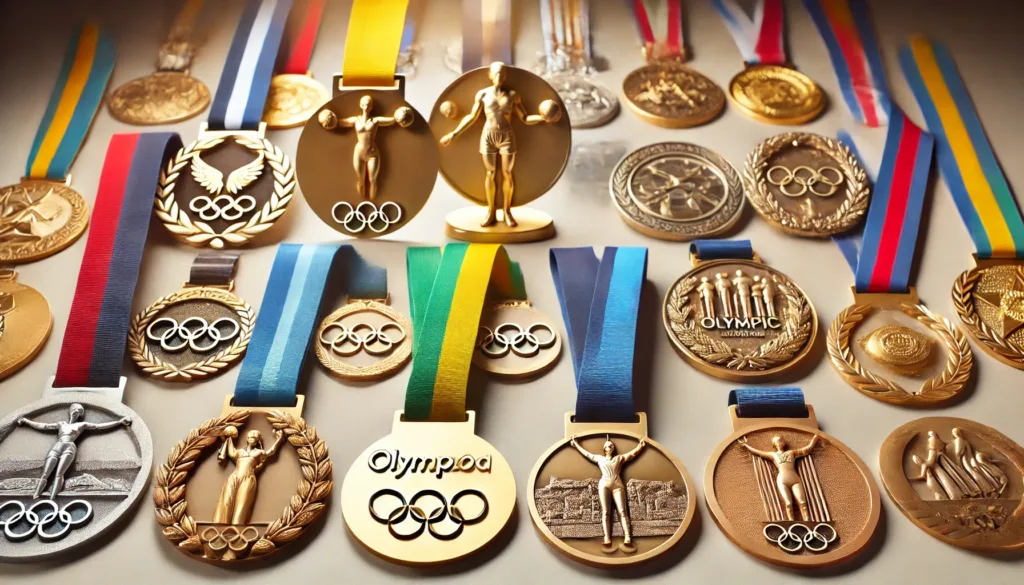Sports medals are an essential aspect of athletic competitions, representing achievement, dedication, and success. Whether it’s the iconic Olympic gold, the shiny trophies at local tournaments, or specialty event awards, medals come in different forms, each holding its unique significance. In this article, we will delve into the different types of sports medals, how they are awarded, and what makes each one special.

Introduction
When you think of sports, one of the first things that may come to mind is the image of athletes proudly wearing medals around their necks. These glittering symbols of victory are not just for show; they signify an athlete’s hard work, perseverance, and talent. But do you know there are various types of sports medals, each representing a different level of achievement?
From prestigious Olympic gold medals to specialized awards given at youth leagues or charity events, the world of sports medals is diverse. These tokens of success come in several forms, each serving as a lasting reminder of an athlete’s journey. Let’s take a deeper look into the various types of sports medals, the significance of each, and how they are awarded across different competitions.
The Different Types of Sports Medals
Olympic Medals: The Pinnacle of Achievement

Olympic medals are arguably the most recognized and coveted awards in the world of sports. They are awarded to athletes who perform at the highest level during the Summer and Winter Olympics. There are three primary types of Olympic medals:
- Gold Medal: The gold medal symbolizes the highest level of achievement in Olympic sports. Contrary to popular belief, Olympic gold medals are not made entirely of gold. They are primarily composed of silver and coated with a thin layer of gold. Winning a gold medal is the ultimate honor, representing the athlete’s dominance in their sport.
- Silver Medal: The silver medal is awarded to the athlete who finishes in second place. While not as prestigious as gold, it still symbolizes an incredible level of excellence and accomplishment.
- Bronze Medal: Bronze medals are awarded to the athlete who finishes in third place. While it may not carry the same prestige as gold or silver, bronze still represents a noteworthy achievement in the competition.
Each of these Olympic medals is meticulously designed to reflect the host country’s culture and history, and they are cherished as symbols of personal and national pride.
World Championship Medals: Excellence in Global Competitions

World Championship medals are awarded in various sports, from track and field to swimming, boxing, and even esports. These medals signify the best of the best on a global scale, often following rigorous qualification rounds and competitions.
- Gold Medal: Much like the Olympic gold medal, the World Championship gold medal is a highly sought-after prize. Athletes who win gold in these competitions often gain global recognition and are considered some of the best in their discipline.
- Silver Medal: The silver medal at the World Championship is awarded to athletes who finish second. It holds significant prestige, particularly for those who narrowly missed out on the top spot.
- Bronze Medal: As with the Olympic Games, bronze medals in world championships recognize third-place finishers, celebrating their excellence in the sport.
National Championship Medals: Domestic Glory
National championships are organized by individual countries to crown their best athletes. The medals awarded at these events are typically similar to those given at international competitions, but they are limited to athletes within that specific country.
- Gold Medal: The gold medal in national championships is a huge honor and often serves as a stepping stone for athletes hoping to represent their country at international competitions.
- Silver Medal: The silver medal in national championships is still highly regarded, especially in countries where sports competition is fierce.
- Bronze Medal: The bronze medal in national championships represents an impressive feat, as national competitions often feature some of the most talented athletes from across the country.
Regional or Continental Medals: Local Glory on the International Stage
Regional or continental competitions, such as the Pan American Games, the European Championships, and the Asian Games, offer athletes the chance to represent their regions. These events typically award medals in a similar fashion to the Olympics, but with a focus on regional rather than global recognition.
- Gold Medal: The gold medal at these events is a significant achievement, representing the best athlete in that particular region of the world.
- Silver Medal: The silver medal is awarded to second-place finishers and is a mark of excellence at a regional level.
- Bronze Medal: Athletes who finish third in these regional competitions are awarded bronze, which represents a strong showing among a competitive field.
Special Event Medals: Recognition Beyond the Podium
Special events like marathons, charity sports events, and invitational tournaments also award medals. While these medals may not carry the same level of prestige as Olympic or World Championship medals, they are still highly valued by participants.
- Participation Medals: These medals are often awarded to everyone who participates in an event, whether they win or lose. While they are not a mark of excellence, they recognize the athlete’s commitment and effort.
- Custom Medals: Many events offer customized medals that represent the unique theme or cause of the competition. These medals might feature special designs and are often designed to commemorate the event itself.
Youth and Amateur Medals: Early Recognition

Youth and amateur medals are given at local and school-level competitions, as well as for age-group categories in larger competitions. These medals encourage young athletes and help foster a love for sports early on.
- Gold, Silver, and Bronze Medals: Just like in professional sports, gold, silver, and bronze medals are awarded to the top three finishers in these categories, providing young athletes with a sense of achievement.
- Encouragement Medals: In some cases, participants who do not win are awarded encouragement medals. These medals may not denote a place on the podium, but they serve to inspire continued effort and growth in the sport.
Commemorative Medals: Celebrating Milestones
Commemorative medals are often given for non-competitive events or as part of anniversary celebrations. They are designed to mark milestones in the world of sports or to honor legendary athletes, coaches, or contributors to the sport.
- Anniversary Medals: Some sports organizations produce commemorative medals to celebrate significant anniversaries, such as a league’s 50th year of competition or a sport’s first international tournament.
- Tribute Medals: These medals are sometimes awarded in memory of a notable individual or event. For example, a medal might be given to commemorate the career of a legendary coach or athlete.
Military and Para-Sports Medals: Acknowledging Sacrifice and Resilience

Military and para-sports medals hold a unique place in the world of sports. These medals are often awarded to athletes who overcome significant physical challenges or those who serve their country in military capacity while excelling in sports.
- Military Medals: Awarded to military personnel who excel in sports, military medals are a source of pride and recognition. They are often linked to service and sacrifice.
- Para-Sports Medals: Para-sports medals are awarded to athletes with disabilities who participate in the Paralympics or other international events. These medals celebrate resilience, determination, and overcoming adversity.
Conclusion
Sports medals, in all their forms, represent far more than just a tangible award. They symbolize hard work, dedication, and the pursuit of excellence. From Olympic gold to local youth medals, each type holds significant meaning for the athletes who earn them. Whether a medal is awarded for a world-class performance or simply for participating in an event, it signifies the athlete’s commitment to the sport and their personal journey toward success.
No matter the level, every sports medal is a reminder that every effort counts and every competition, big or small, can lead to achievement and pride.